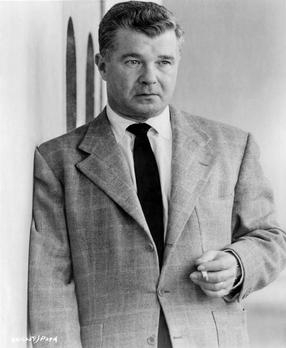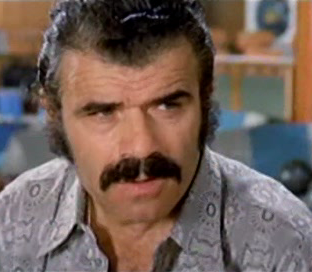Related Research Articles

William Franklin Holden was an American actor and one of the biggest box-office draws of the 1950s. Holden won the Academy Award for Best Actor for the film Stalag 17 (1953) and the Primetime Emmy Award for Outstanding Lead Actor in a Limited or Anthology Series or Movie for the television miniseries The Blue Knight (1973).

Michael Latham Powell was an English filmmaker, celebrated for his partnership with Emeric Pressburger. Through their production company The Archers, they together wrote, produced and directed a series of classic British films, notably The Life and Death of Colonel Blimp (1943), A Canterbury Tale (1944), I Know Where I'm Going! (1945), A Matter of Life and Death, Black Narcissus (1947), The Red Shoes (1948), and The Tales of Hoffmann (1951).

Pirates of the Caribbean: The Curse of the Black Pearl is a 2003 American fantasy swashbuckler film directed by Gore Verbinski. Produced by Jerry Bruckheimer and distributed by Walt Disney Pictures, the film is based on the Pirates of the Caribbean attraction at Disney theme parks and is the first film in the Pirates of the Caribbean film series. The film stars Johnny Depp, Geoffrey Rush, Orlando Bloom, and Keira Knightley. The plot follows the pirate Jack Sparrow (Depp) and the blacksmith Will Turner (Bloom), as they attempt to rescue the kidnapped Elizabeth Swann (Knightley). The trio encounters Captain Hector Barbossa (Rush) and the crew of the Black Pearl, who are afflicted by a supernatural curse.

Crime films, in the broadest sense, is a film genre inspired by and analogous to the crime fiction literary genre. Films of this genre generally involve various aspects of crime and its detection. Stylistically, the genre may overlap and combine with many other genres, such as drama or gangster film, but also include comedy, and, in turn, is divided into many sub-genres, such as mystery, suspense or noir. It also includes mafia dramas.

An exploitation film is a film that tries to succeed financially by exploiting current trends, niche genres, or lurid content. Exploitation films are generally low-quality "B movies", though some set trends, attract critical attention, become historically important, and even gain a cult following.

Robert Rossen was an American screenwriter, film director, and producer whose film career spanned almost three decades.

Richard Brooks was an American screenwriter, film director, novelist and film producer. Nominated for eight Academy Awards in his career, he was best known for Blackboard Jungle (1955), Cat on a Hot Tin Roof (1958), Elmer Gantry, In Cold Blood (1967) and Looking for Mr. Goodbar (1977).

In Italian cinema, giallo is a genre of murder mystery fiction that often contains slasher, thriller, psychological horror, psychological thriller, sexploitation, and, less frequently, supernatural horror elements.

Harald Reinl was an Austrian film director. He is known for the films he made based on Edgar Wallace and Karl May books and also made mountain films, Heimatfilms, German war films and entries in such popular German film series as Dr. Mabuse, Jerry Cotton and Kommissar X. His directing output includes more than 60 titles. With his Edgar Wallace and Karl May adaptations, Reinl advanced to become one of the most successful directors in German cinema in the 1960s: with the four Karl May films he made between 1962 and 1965 alone, Reinl reached 32 million viewers.

Robert Jolin Osborne was an American film historian, author, actor and the primary television host for the premium cable channel Turner Classic Movies (TCM) for over twenty years. Prior to hosting at TCM, Osborne had been a host on The Movie Channel and American Movie Classics (AMC). He had also worked as a news columnist for The Hollywood Reporter. Osborne wrote the official history of the Academy Awards, with the first edition published in 1988.
Kenneth Graham Hughes was an English film director and screenwriter. He worked on over 30 feature films between 1952 and 1981, including the 1968 musical fantasy film Chitty Chitty Bang Bang, based on the Ian Fleming novel of the same name. His other notable works included The Trials of Oscar Wilde (1960), Of Human Bondage (1964), Casino Royale (1967), and Cromwell (1970). He was an Emmy Award winner and a three-time BAFTA Award nominee.

Bahrām Beyzāêi is an Iranian playwright, theatre director, screenwriter, film editor, and ostād ("master") of Persian letters, arts and Iranian studies.

Tatsumi Kumashiro was a Japanese film director known for his critically acclaimed, award-winning Roman Porno films, such as Ichijo's Wet Lust (1972) and The Woman with Red Hair (1979). He was the most highly acclaimed director of the early Nikkatsu Roman Porno era, with many box-office successes, and films regularly appearing on the yearly Best Ten lists of the mainstream Kinema Junpo and Eiga Geijutsu film journals. Kumashiro has been called, "the most consistently successful director in Japan's cinematic history," and Allmovie calls him, "arguably the most important Japanese director to emerge during the 1970s."

Elizabeth Fong Sung was a Chinese-American actress, director, and screenwriter. She was also a revered acting teacher and mentor to young performers and filmmakers in the Asian-Pacific community.
Midnight Ramble is a 1994 documentary about the early history of Black American movies from the period between 1910 and 1950. Known as "race movies", these films, traditionally independent of Hollywood, were made primarily by, for and about the black community. This documentary is a tribute to a film genre that lasted for more than 40 years, produced over 500 movies, and created a foundation for contemporary films from directors such as Spike Lee and Tyler Perry. James Avery narrates this exploration of the early black film industry. There is a mistaken assumption that "race films" began largely in reaction to D. W. Griffith's 1915 The Birth of a Nation. Nothing could be further from the truth. Race movies actually began around 1910 in Chicago in response to the Black Community longing to see themselves reflected on the silver screen via this new medium of film. Wanting to see themselves through their own eyes, on their own terms thus counteracting the Hollywood stereotypes within the American media.

Chor Yuen, born Cheung Po-kin, was a Hong Kong film director, screenwriter, and actor. Chor is credited with over 120 films as director, over 70 films as a writer and over 40 films as an actor.

Tano Cimarosa, real name Gaetano Cisco, was an Italian actor, screenwriter and film director. He participated in more than fifty movies.

Blaxploitation is an ethnic subgenre of the exploitation film that emerged in the United States during the early 1970s, when the combined momentum of the civil rights movement, the black power movement, and the Black Panthers spurred African-American artists to reclaim the power of depiction of their ethnicity, and institutions like UCLA to provide financial assistance for African-American students to study filmmaking. This combined with Hollywood adopting a less restrictive rating system in 1968. The term, a portmanteau of the words "black" and "exploitation", was coined in August 1972 by Junius Griffin, the president of the Beverly Hills–Hollywood NAACP branch. He claimed the genre was "proliferating offenses" to the black community in its perpetuation of stereotypes often involved in crime. After the race films of the 1940s and 1960s, the genre emerged as one of the first in which black characters and communities were protagonists, rather than sidekicks, supportive characters, or victims of brutality. The genre's inception coincides with the rethinking of race relations in the 1970s.
Ho Meng Hua was a Chinese film director from Shanghai, working in the Cinema of Hong Kong and the Cinema of Taiwan.
References
- ↑ Gelmis, Joseph (13 Sep 1972). "Black Movies: Hollywood's Big Box-Office Kick". Austin American-Statesman. Retrieved 2020-06-07.
- 1 2 McKay, Elisa (February 24, 2023). "Red Carpet Memorial Tribute for Director Oscar S. Williams at Caribbean Cinemas Sunday". St. Thomas Source. Retrieved September 27, 2023.
- ↑ "Death Drug". Turner Classic Movies . United States: Turner Broadcasting System . Retrieved July 16, 2018.